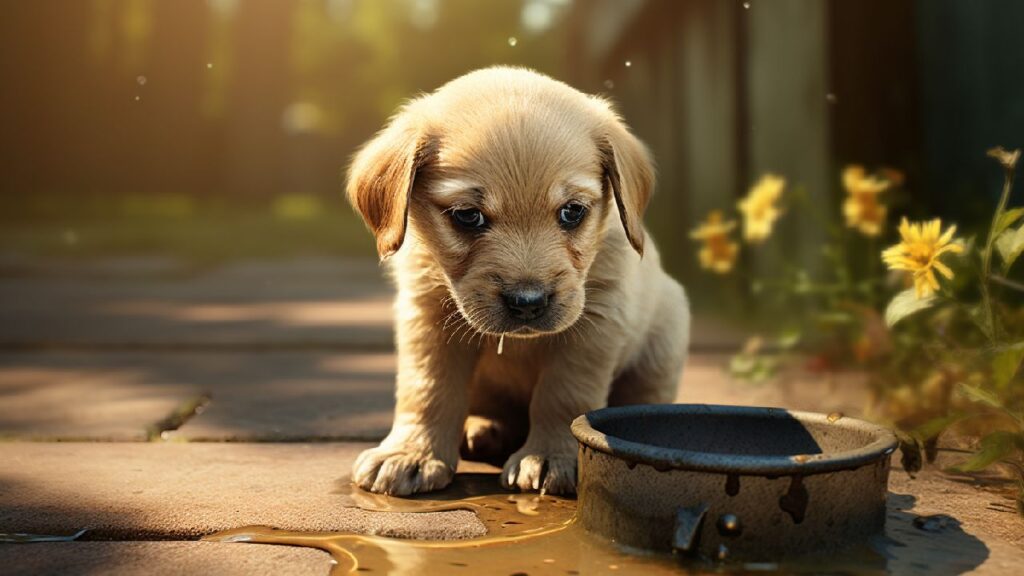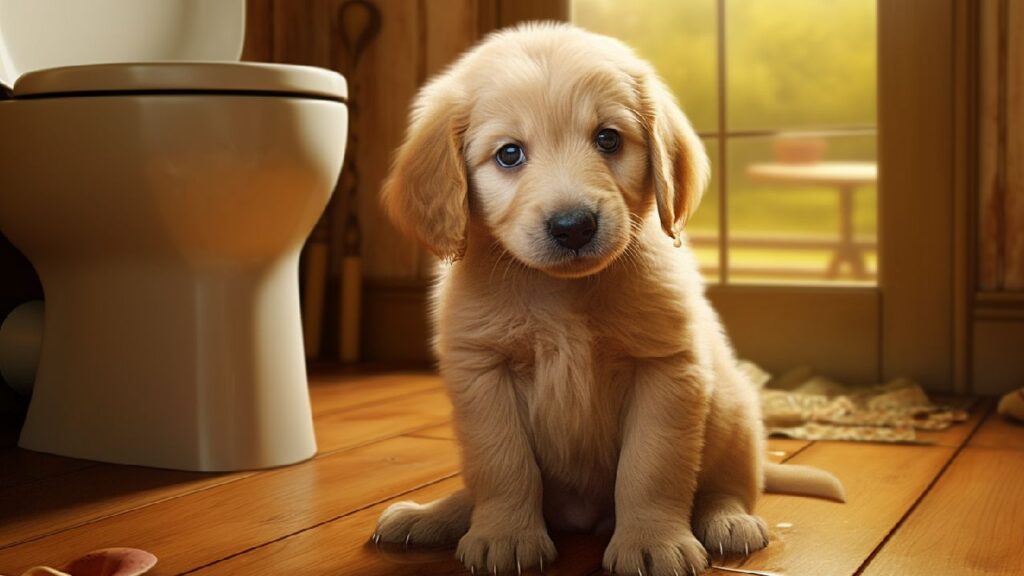Puppies are bundles of joy, bringing boundless energy and love into our lives. However, they can also experience health issues; one common concern is puppy diarrhea.
Understanding what causes it, the different types, and how to respond when your little one is unwell is crucial to ensuring their well-being. This article will explore everything you need to know about puppy diarrhea.
What is Diarrhea?
Diarrhea is a gastrointestinal condition characterized by frequent, loose, and watery bowel movements. It occurs when the normal process of absorbing water and nutrients from the food and fluids passing through the digestive system is disrupted. Instead of the stool being formed and solid, as it should be, diarrhea results in liquid or semi-liquid stools.
The main concern with diarrhea is the risk of dehydration, as the body loses fluids and electrolytes more rapidly than expected. It is essential to address diarrhea promptly, especially in vulnerable populations like infants, the elderly, or individuals with compromised immune systems, to prevent dehydration-related complications.
Diarrhea can be caused by various factors, including infections, dietary changes, food allergies, medications, stress, and underlying medical conditions. It is a common symptom of gastrointestinal illnesses and can vary from mild to chronic.
Causes of Diarrhea in Puppies
Here’s a more detailed explanation of the causes of diarrhea in puppies, presented in a list for clarity:
- Dietary Changes: Changing your puppy’s diet, introducing new foods or treats, or feeding them table scraps can upset their sensitive digestive system. Sudden dietary changes can lead to diarrhea.
- Parasitic Infections: Puppies are susceptible to various intestinal parasites like roundworms, hookworms, whipworms, and Giardia. These parasites can cause diarrhea, often with blood or mucus in the stool.
- Bacterial Infections: Bacterial pathogens like Salmonella or Campylobacter can cause gastrointestinal distress, leading to diarrhea. Puppies may contract these bacteria from contaminated food, water, or their environment.
- Viral Infections: Viruses such as parvovirus and distemper can lead to severe diarrhea in puppies. These infections are highly contagious and can be life-threatening if not treated promptly.
- Food Allergies or Sensitivities: Some puppies may have food allergies or intolerances to certain ingredients in their diet. These can trigger gastrointestinal issues, including diarrhea, as the puppy’s immune system reacts to the allergens.
- Inflammatory Bowel Disease (IBD): Though less common in puppies, IBD is a chronic condition where the immune system mistakenly attacks the lining of the digestive tract, leading to chronic diarrhea.
Identifying the specific cause of your puppy’s diarrhea is essential to determine the most appropriate treatment and ensure their overall health.
Types of Puppy Diarrhea
There are two main types of puppy diarrhea:
Acute Diarrhea
Acute diarrhea is a sudden, short-lived bout of loose or watery stools in puppies. It’s usually caused by:
- Dietary Changes
- Infections
- Stress
- Parasites
Symptoms include frequent loose stools, straining, and potential dehydration.
Treatment involves a bland diet, hydration, and, in some cases, medication.
Chronic Diarrhea
Chronic diarrhea is ongoing, persistent loose or watery stools that last for weeks or months in puppies. It can be caused by:
- Parasitic Infections
- Food Allergies
- Inflammatory Conditions
- Underlying Health Issues
Symptoms include continuous loose stools, weight loss, lethargy, and potential dehydration. Treatment involves identifying and addressing the underlying cause through dietary changes, medications, and veterinary care.
What to Do if Your Puppy Has Diarrhea?
- Monitor Your Puppy: Observe the frequency and consistency of diarrhea. Watch for other concerning symptoms like lethargy, vomiting, or blood in the stool.
- Ensure Hydration: Provide fresh water at all times to prevent dehydration. Consider using an oral rehydration solution if dehydration is a concern.
- Dietary Adjustment: Temporarily switch to a bland diet: boiled white rice and skinless, boneless chicken. Offer small, frequent meals to ease the stomach.
- Remove Potential Stressors: Create a calm and quiet environment to reduce stress.
- Contact Your Veterinarian: If diarrhea persists for more than 24 hours, worsens, or is accompanied by severe symptoms, contact your veterinarian. Provide details about your puppy’s diet, routine changes, and other relevant information.
Remember, prompt action and veterinary care are essential to ensure your puppy’s health and a quick recovery from diarrhea. Tailor your approach based on your puppy’s specific condition and follow your veterinarian’s advice closely for the best results.
Conclusion
Puppy diarrhea can be a distressing experience, both for your furry friend and for you. However, understanding the causes, types, and appropriate responses can help your puppy recover and ensure their continued health and happiness.
Always remember that consulting your veterinarian is crucial when dealing with persistent or severe diarrhea.

FAQs
Can I give my puppy over-the-counter medications for diarrhea?
It’s best to consult your veterinarian before administering any medications to your puppy, as some can be harmful.
How can I prevent diarrhea in my puppy?
Maintain a consistent diet, clean your pup’s living environment, and follow a regular deworming schedule.
Is it normal for puppies to have occasional diarrhea?
Occasional mild diarrhea can be regular due to dietary changes or stress. However, chronic or severe diarrhea warrants attention.
Should I stop feeding my puppy if they have diarrhea?
It’s advisable to feed your puppy a bland diet temporarily. Consult your vet for specific recommendations.
Can puppy diarrhea be a sign of a more serious health issue?
Yes, chronic or severe diarrhea can indicate underlying health problems, so it’s crucial to consult a veterinarian for a proper diagnosis.








Our little Bella had a tough time with diarrhea last week. Your article was a lifesaver! Thanks for the helpful advice.
dealing with puppy diarrhea is no fun
Ugh, puppy diarrhea is the worst! Thanks for keeping us informed.